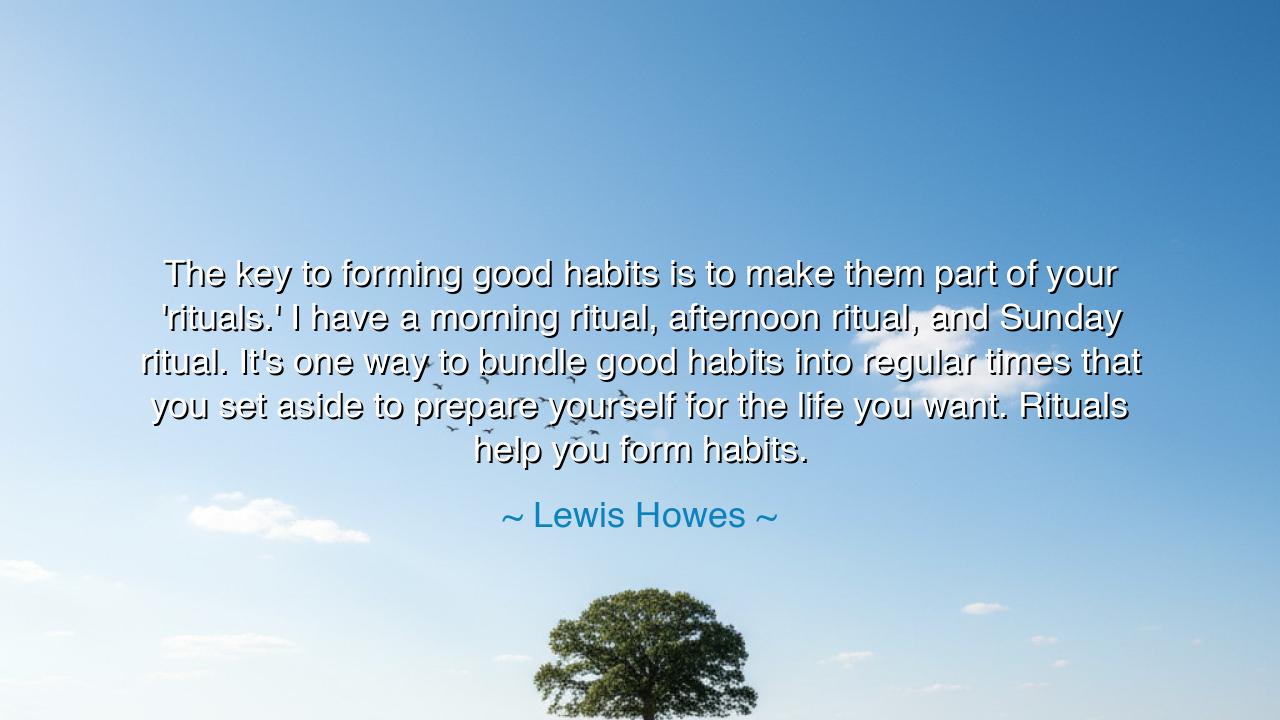
The key to forming good habits is to make them part of your
The key to forming good habits is to make them part of your 'rituals.' I have a morning ritual, afternoon ritual, and Sunday ritual. It's one way to bundle good habits into regular times that you set aside to prepare yourself for the life you want. Rituals help you form habits.






"The key to forming good habits is to make them part of your 'rituals.' I have a morning ritual, afternoon ritual, and Sunday ritual. It's one way to bundle good habits into regular times that you set aside to prepare yourself for the life you want. Rituals help you form habits." In these words, Lewis Howes speaks of a profound truth about the nature of habits, discipline, and self-creation. Rituals, according to Howes, are the powerful force that enables us to turn good intentions into lasting actions. It is not enough to simply want to change or grow; one must actively build time into their day, structuring it around practices that support growth, well-being, and success. Rituals become the framework within which the seeds of habits are sown and allowed to flourish.
In the ancient world, rituals were considered the cornerstone of order, purpose, and meaning. The Greeks and Romans understood that life must be anchored in regular practices, both sacred and mundane, to maintain balance and focus. The Stoic philosophers, such as Marcus Aurelius, adhered to a strict daily routine—beginning their mornings with reflection, ending with gratitude, and taking time throughout the day to engage in exercises of virtue and discipline. Their rituals were not just about maintaining physical health but also about fortifying their inner selves. Like Howes’ morning ritual, the Stoics believed that by setting time aside for reflection and action, they could shape their character and direct their lives toward purpose.
Consider the ancient Egyptians, who built their lives around sacred rituals meant to honor their gods and ensure the balance of the universe. From the daily offerings to the gods to the embalming of the dead for the afterlife, rituals formed the foundation of their worldview. Each action was intentional, performed with the belief that by adhering to ritual, they could align their lives with the cosmic order. Rituals were not mere formalities; they were deeply meaningful acts that connected them to their higher purpose. Howes' rituals, while not of a sacred nature, resonate with this same sense of purpose. By setting aside specific times for important activities, he, like the ancients, uses the framework of ritual to shape his life with intention.
In more recent times, we can look to the life of Benjamin Franklin, who famously adhered to a rigorous daily schedule designed to cultivate good habits and virtues. Franklin's schedule was filled with rituals: he would wake early each morning to ask himself, “What good shall I do this day?” and he would spend time each evening reflecting on his actions, ensuring he was always moving closer to his ideals. Franklin believed that through careful scheduling and a disciplined routine, he could shape his life into one of virtue and effectiveness. His daily rituals of reflection, study, and self-examination served as a guidepost for personal growth. Much like Howes, Franklin understood that rituals turn intention into action and transformation.
The wisdom of Howes' words lies in his understanding of the power of consistency and discipline. It is not enough to simply desire change; one must create the structures necessary to ensure that change becomes habitual. Habits are often seen as the result of repetition, but what Howes suggests is that repetition becomes meaningful when it is framed within the larger context of ritual—a sacred, intentional act that connects us to our deeper desires and higher purpose. Whether it is a morning ritual of mindfulness and exercise or a Sunday ritual of rest and reflection, these actions become the anchors that keep us grounded in our aspirations and true to our values.
The lesson here is simple: to shape our future, we must begin by shaping our days. As ancient cultures understood, and as modern wisdom now teaches, we must take charge of our time, creating rituals that connect us to our deepest values and help us stay on course. By consciously designing our days with intention—whether through habits of health, creativity, study, or reflection—we create a roadmap for success. Just as the ancients practiced rituals to connect with the divine and align with the universe, we too can use rituals to align our actions with the life we wish to create.
In our own lives, let us take this wisdom and begin to craft our own rituals—small, intentional acts that ground us and connect us to our deepest purposes. Whether it is a ritual of gratitude upon waking, a midday pause for reflection, or a nighttime practice of gratitude or journaling, we can build habits into our days that shape our character and move us toward the life we envision. As Howes teaches us, rituals are not just about what we do, but about how we show up each day—intentional, aware, and ready to live out our values and purpose. Through ritual, we create a structure for our lives that transforms intention into lasting habit and meaning.






AAdministratorAdministrator
Welcome, honored guests. Please leave a comment, we will respond soon